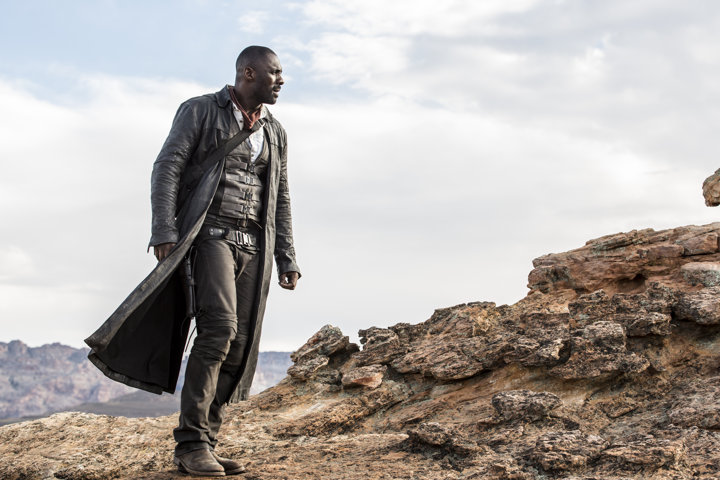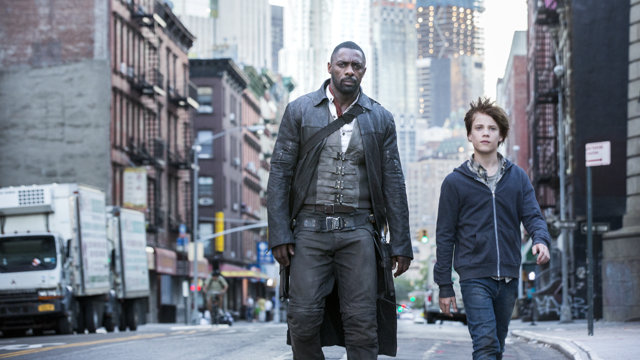Quick and Dirty Take: The Dark Tower is just a good summer movie but it had (almost) everything it needed to be so, so, so, so, much more and just never managed to get out of its own way. The look, and feel of the film brought all the elements of Stephen King’s world(s) to believable fruition – then was barely used any to add layers to varied and rich themes in the story. The actors gave solid performances – that didn’t ask nearly enough of them. The story arc – which should’ve been a constant dynamic, multisensory, mystical thrill ride – was hammered and shoved into a simplistic fantasy film formula that left it at odds with itself. Ultimately, I feel like I watched a good epilogue to a really great story (that I didn’t get to see) play out on screen.
Grade: B+
Now, let’s really talk about the film:
The Upside:
Roland Deschain is the most intriguing person in this film and from the moment of his first appearance, the flashbacks featuring him, and dialogue revealing some of his backstory coupled with his action sequences are the only consistently dynamic and engaging moments in The Dark Tower. I wanted to know more about his past, his bloodline, his place in the multiverse and the battle that’s left him embittered enough to question his mission.

Idris Elba fully embodies the mythos of the last Gunslinger and more than satisfies everything I imagined him to be (when reading) made manifest. He’s driven, conflicted, tormented, focused, dry-witted, deadpan, and dangerously broody. This film isn’t nearly good enough for the Roland Deschain he created. He was interesting in a way no one and nothing else manages to be.
I think not making him truly the central figure in the film’s the story arc was a disastrously stupid decision.
The Downside(s):
The Dark Tower is the film adaptation of characters from Stephen King’s Gunslinger Saga. I specify characters because the film’s story picks up after the events in the written – eight book – series.
Ordinarily, I’d call this a smart move given the sheer volume of material and themes in the Gunslinger universe; but this movie has no clue who it’s aimed at pleasing: fans who know this world (and therefore don’t need too much backstory or verbal clues to know what’s what), or urban fantasy movie fans with no connection to the source material but are pretty intuitive, or summer movie go-ers who expect breadcrumbs and blinking neon lights at every turn.
I’m also not sure if the story goal was to wrap up all the bookish outliers and loose ends in this universe in a pretty bow or to actually set-up for more adventures in the Gunslinger universe (it feels a little like the arguments over whether Shane is dead riding away on that horse or just ignoring that kid for all he’s worth and not looking back at the end of the movie).
In trying to serve multiple masters, The Dark Tower leaves too much out of it’s world building and shoves too much in your face as a given simultaneously. Aspects of the film and and story that otherwise would be more than just visually unsettling are glossed over or left unexplored. The timeline is poorly portrayed and the frequently moved along with dialogue data-dumps instead of action; and if you haven’t read the books seemingly off-hand comments or flashback sequences have no thematic substance and lack the significance they should in carrying you through the story’s development.
It’s like a girl who couldn’t decide which body part to feature with her outfit choice and ends up looking an inappropriately dressed hot mess for her event.
Jake Chambers:
The film opens with Jake Chambers (Tom Taylor) a preteen living in New York at a time of unexplained seismic phenomena ( devastating earthquakes) whose parents are convinced he’s one sleep-deprived night away from a psychotic break. He has disturbing dreams and perpetually looks like he’s on day 50 of an extended bender. Through him, the supernatural elements of this story (particularly the dark tower itself) are presented as merely the sketches and possible delusions of a potentially disturbed mind. This disgustingly overused tactic for inserting the inexplicable into visual urban fantasy robbs the vivid imagery of the weight and relevance it should carry in telling this story.
Almost every directorial choice (or maybe editing choice) dulls the magical mystery and rushes through what should be huge reveals and backstory. The mystical becomes almost mundane; even after Jack’s proven to be very, very sane.
The story arc is predictable: young (special) boy – because some folks can’t resist creating a *ahem* savior figure to put front and center- caught up in a battle between the forces of good and evil, used as a pawn in an endless feud between the last two sides. I didn’t actually think it was possible to dumb down The Dark Tower and yet somehow…they managed it. Each revelation dropped like a anvil rather than vividly unveiling this universe and the ongoing conflict in a way that informs while investing the audience in both the characters and story.
Jake Chamber’s relationship with his parents (Katheryn Winnick and Nicholas Pauling) and school environment are all fractious and created plenty of openings for more than the haphazard and surface development given to these characters. The actors all made the most of what was given to them but there’s no depth, grit, or nuance to these relationships which is completely at odds with most everything about this universe and how you’re suppose to connect to Jake.
In accordance with the rule against spoilers, I’ll simply say, they cast a young man capable of giving a convincing portrayal of a tormented kid hanging on by a thread then over-emphasizes absolutely everything about his plight but what’s vitally important about his character in this universe.
I’m not saying no story building exists, I’m saying it’s paper thin and hardly enough to explain a thing or make you really ready to follow along with him as your guide. Putting him at the center of the story is idiotic because as written, he doesn’t know enough to be a reliable narrator.
Given a few dialogue slips – I’m relatively convinced film editors weren’t exactly sure of the final story direction either- by Walter O’Dim (Matthew McConaughey) character, as well the conversation in stupidly truncated scene with Arra Champignon (Claudia Kim); somewhere there exists a version of this script that handled these story elements properly.
His role in this universe and the battle occurring between the worlds is significant but hardly for any of the reasons this movie gives you which is an unforgivable misstep if they’re planning to move forward with more stories.
The Man In Black:
The movie (*ahem* the director) repeatedly fails to seize opportunities – and they are plentiful – to explore the complexity of antagonist Walter O’Dim aka The Man In Black (McConaughey) leaving his connective threads too underdeveloped to be as intimidating as they should be and his portion of the world building delivered in either heavy-handed yet somehow still unenlightening dialogue or disconnected scenes too frayed to properly orient him in the universe.
Although riddled with visual easter eggs and crafted to have a seamless, hyper-realistic cinematic feel, the director, Nikolaj Arcel, introduces otherwise mystical and supernatural elements with no little style.
Visually, McConaughey works as the Man in Black (many diehards will disagree) but he’s given so little to work with that his part feels more like an interjection rather than a proper villain.
With no clear backstory elements (except clues from the book that do non-readers no good) here, Walter reads like a cookie cutter bad guy the director and writer use to shove all the exposition into the plot. It’s a waste of a talented actor to simplify such a great character.
I think it should be more than obvious that screenwriter Akiva Goldsman shouldn’t be part of crafting film adaptations of science fiction/fantasy/thriller…ok, books; they’ve got got to stop letting him adapt books. It’s like he hates the source material on sight and immediately goes to war with it.
Given that he’s but one of three people (including the director) credited with working on the script for The Dark Tower, it may seem like I’m harshly singling him out to blame but look at his previous handiwork (The 5th Wave, Winter’s Tale, I Am Legend) the end product speaks for itself. Ultimately, the end product tangibly feels like too many different hands (who all had no respect for each other) touched this script and no cohesive vision survived. And almost from the outset, the script fails its actors to the point if feels like three different versions were cannibalized to create the final cut.
The Gunslinger Saga unfolds in multi-dimensional world(s) one of which is Earth as we know it and another world hanging on amidst the wreck cataclysmic events that ruined what was once clearly an advanced society with old western underpinnings right down to six-shooting, long duster wearing, taciturn gunslingers. The Dark Tower as a jumping off point for more films and televisions shows works, but as an introduction to this universe it’s created some serious continuity issues and needed world building for future installments and projects to address.
By not taking a single thematic risk (hence the short runtime) The Dark Tower creates a pretty introduction of the characters ready for more films and the companion television series by leaves only the thinnest connective thread to the original series arc.
Think of The Dark Tower as a visual novella – if you will – merely featuring Roland, the last Gunslinger and you’ll enjoy it.
Overall Rating: 3 stars out of 5
Sidenote:
- Stephen King books are one of the reasons I happily accepted being grounded.
- I automatically expect film adaptations of mix-genre books to fall short and be nowhere near as good so that I an continue being a (semi)sane film and TV show junkie.
- I have an completely inappropriate attachment to and affection for both Idris Elba the actor and man.
I had high hopes for The Dark Tower. Some of them were met but not all. I still hold out hope this universe will develop to be as great as the material it’s drawn from.
"The Dark Tower": When Epic Becomes Merely Formulaic
Summary
In trying to serve multiple masters, The Dark Tower leaves too much out of it’s world building and shoves too much in your face as a given simultaneously. Aspects of the film and and story that otherwise would be more than just visually unsettling are glossed over or left unexplored.

